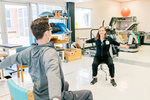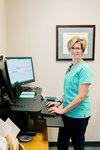


Tony Cimaglia says his wife, Ann, first noticed his symptoms.
Struggles with walking. Leaning forward when standing.
Tony consulted doctors in Fayetteville, Chapel Hill and Durham to find out what was wrong. Dementia was considered a possibility. His symptoms became progressively worse, and, in 2018, he was diagnosed with Parkinson’s disease.
“Once you get to a certain stage, there’s no question you’ve got it,” Cimaglia says.
The retired co-owner and vice president of operations for the M.J. Soffe apparel factory in Fayetteville embarked on a treatment regimen that includes exercise and physical therapy. Now he wants to help bring a more robust therapy program to Fayetteville so that people with Parkinson’s here can benefit from the most effective exercise treatment.
Tony and Ann Cimaglia are donating more than $500,000 to Cape Fear Valley Health Foundation’s Caring for the Future campaign to expand care for neurological diseases, with an emphasis on Parkinson’s.
The hospital system’s rehabilitation department will use the gift to finance the staff training, equipment, technical support and patient assistance needed to implement the Rock Steady Boxing therapy regimen.
Tony Cimaglia has been a vital part of the Foundation since 1995. It was then he and fellow community leaders helped organize the group to further support health care services for the community.
Staying physically active is key to alleviating the effects of Parkinson’s disease, says Rachel Farnham, a physical therapist at Cape Fear Valley Physical Rehabilitation Services.
Farnham says the therapy challenges patients.
“We do big movements,” she says. “We might look like we’re being excessive, but we’re not.”
Parkinson’s patients may speak softly and not realize why others can’t understand them. When prompted to speak louder, they may think the result is exaggerated, she says.
Therapy focuses on physical coordination, endurance, good posture and clear speech, Farnham says. Parkinson’s may cause difficulty with simple tasks like navigating tight spaces or getting out of a chair.
The disease affects about 1 million people in the United States and 10 million worldwide, according to the Parkinson’s Foundation (parkinsons.org).
Parkinson’s and related disorders are the result of a loss of brain cells that produce dopamine, a chemical messenger that transmits signals within the brain. Loss of dopamine leaves patients unable to control movement in a normal manner, according to the foundation.
Primary symptoms include trembling in hands, legs and face; stiffness of the limbs; slowness of movement; and impaired balance and coordination. The disease is both chronic and progressive, and there is no known cure.
Melissa Wisneski, director of rehabilitation therapy services at Cape Fear Valley, says having a nearby Rock Steady program will be important for local Parkinson’s patients.
“A lot of people go north for care,” she says, “which puts undue stress on families and is not necessary.”
Travel distance makes it difficult for some to commit fully to the program.
The Rock Steady regimen incorporates exercises typically used by boxers – patients actually use boxing gloves and punching bags to strengthen balance, coordination and endurance.
Cape Fear Valley is in the process of applying with Rock Steady Boxing for approval to start the program in Fayetteville, Wisneski says. Therapists will need training, and equipment must be purchased. The goal is to have the program up and running this fall.
“With the new Neuroscience Institute at Cape Fear Valley opening later this summer, this was the ideal time for the Cimaglias to ensure this expanded care included the resources needed for those living with Parkinson’s Disease,” says Sabrina Brooks, vice president of the Cape Fear Valley Health Foundation.
Tony Cimaglia says working with a personal trainer three times a week helps him stay committed to dealing with Parkinson’s.
“It gets intense,” he says of the workouts.
Because of the progressive nature of the disorder, it’s important to stay active and buy in to regular physical therapy sessions, say therapists Farnham and Wisneski.
“There is no cure,” adds Wisneski. “It’s not something we are going to fix.”
But for Tony Cimaglia and others, that’s no reason to give up in the fight for a more robust tomorrow.
The Cimaglias hope this gift will continue to transform therapy for Parkinson’s patients in the area and improve the quality of life for patients for many years to come.